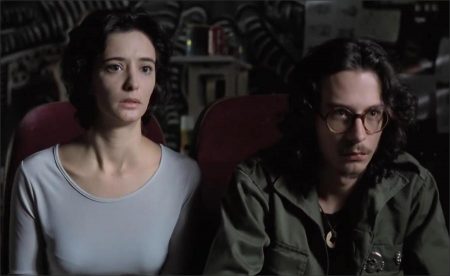Tesis
Thesis movie storyline. As Ángela is sitting on a subway, the train halts and passengers are told to evacuate. A man has committed suicide by jumping in front of the tracks and died. While being led out of the station, Ángela begins to move towards the tracks to see the man’s remains. She is warded away at the last instant.
Ángela is a university student in Madrid, writing a thesis on audiovisual violence in the family. At a thesis meeting, she asks her thesis director, Professor Figueroa, to help her find the most violent videos in the school’s video library. After class, Ángela seeks out the help of a fellow student, Chema, who is known for his collection of violent and pornographic videos. As Ángela begins to watch violent films with Chema, Figueroa finds a tape in a hidden hallway of the school’s audiovisual archives.
Tesis (Thesis) is a 1996 Spanish thriller film. It is the feature debut of director Alejandro Amenábar, and was written by Amenabar and Mateo Gil. The film was made while he was still studying at Universidad Complutense in Madrid. The movie won seven 1996 Goya Awards, including the award for Best Film, Best Original Screenplay, and Best Director. It stars Ana Torrent, Fele Martínez and Eduardo Noriega.
Democratic Transition After the fall of Francisco Franco’s military dictatorship in the late seventies, Spain began transitioning into democracy. The shift from a strictly conservative regime to a Westernized democracy resulted in drastic cultural changes known as La Movida. These changes included the introduction of contraception and abortion, the inclusion of women in the public sphere, and a decline in Catholicism. Violence Against Women Even after women were considered members of the public sphere during the democratic transition, violence against women was still considered a private or family problem. It wasn’t until the late nineties that the Spanish Government began enforcing policies or regulations dealing with the issues of domestic abuse and rape. In 1995, the year Tesis was being created, the United Nations held the first Fourth World Conference on Women in Beijing, which defined violence against women as: “Any act of violence based on gender, which may result or actually results in physical, sexual or psychological harm, including threats, coercion or arbitrary deprivation of liberty, in either private or public life”. This definition began shaping regulations in Spain during the late nineties, and many laws and acts have been passed since. Gender Inequality Although women in Spain earned the right to vote under Franco’s military dictatorship, divorce was impossible, women could not open bank accounts, obtain passports, or buy property without their husband’s permission. During democratic transition, Spain’s socialist government created the Institute for Women in 1983 in order to promote equal rights. Women’s rights have been slowly, yet continuously improving since the military dictatorship fell, and Spain in the 1990s was witnessing the beginnings of these cultural changes. Ángela, the protagonist of Tesis, is a female grad student. This is an unusual, but not unheard of, occurrence for the time period. Ángela’s younger sister, Sena, is starting to study law. Amenabar’s female characters in Tesis, with the exception of Ángela’s mother, operate almost solely in the public sphere. Reality Television During the mid-nineties in Spain, reality television became one of the most consumed genres of entertainment. In 1993, the brutal killing of three young women became the fixation of the Spanish population. After finding the bodies of the three missing teens in a ditch, showing evidence of torture and rape, television channels rushed to report the investigation. The subsequent trial of the murderers also captured national attention. Directed by: Alejandro Amenábar Hits: 178Thesis – Tesis (1997)
Starring: Ana Torrent, Fele Martínez, Eduardo Noriega, Xabier Elorriaga, Miguel Picazo, Nieves Herranz, Rosa Campillo, Paco Hernández, Teresa Castanedo
Screenplay by: Alejandro Amenábar, Mateo Gil
Production Design by: Wolfgang Burmann
Cinematography by: Hans Burman
Film Editing by: María Elena Sáinz de Rozas
Costume Design by: Ana Cuerda
Makeup Department: Eli Adánez, Paca Almenara
Music by: Alejandro Amenábar
Distributed by: Vanguard International Cinema
Release Date: February 8, 1997






